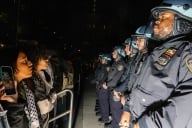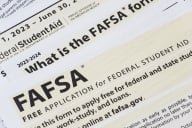You have /5 articles left.
Sign up for a free account or log in.

akinbostanci/Getty Images Signature
Public events are almost always a concern to those in higher education. Educational communities are filled with curious, thoughtful and engaged people, and, of course, our educational mission calls upon us to be engaged with the world. Yet exactly how that engagement can and should manifest itself is occasionally complicated and fraught, as recent events have demonstrated.
Responses and reactions to national and world events from public figures and political leaders are understandable and a required part of their job description. Despite a less public role and often no formal requirement for external engagement, educational institutions and their leaders often feel called to take political positions or engage in public policy debates.
While there are natural ways to engage in classrooms and on campus, a common method of engagement for administrators is to make public statements on behalf of their institutions. Usually, such statements are put out under the signature of the president or chancellor, who is assumed to have the right and responsibility to speak for the institution.
This resulting institutional statements are usually unsurprising and unremarked upon beyond campus borders. Recent examples include statements on policing and systemic racism in the aftermath of George Floyd’s death, public comments about women’s rights following the overturning of Roe v. Wade, and, most recently, support for diversity and affirmative action in response to the Supreme Court’s ruling in the Students for Fair Admissions case.
While most of the public events that elicit institutional statements are not simple and have ethical dimensions, engagement with more morally and historically complex events is particularly challenging and even problematic. Recent Hamas attacks in Israel are a case in point.
The terrorist attacks have called for public responses from many individuals and institutions. While some institutional comment on the attacks in Israel has been more muted than in the case of other recent events, these horrific events have led to some rare disagreements about public statements and to a number of highly unusual interactions within the academy, often tense and occasionally personal.
We have seen leaders criticized for not responding quickly enough or for not making a public response at all. We have seen a past president of a prominent university publicly calling out a current president, initially for not responding at all to the attacks and then for responding too tepidly. We have also witnessed student groups and faculty members stepping into the breach to offer their own public statements that potentially obfuscate who is representing an institutional position. We have seen alumni pushing back not only against administrators’ statements but even suggesting students’ statements might harm their future job prospects.
The multitude of statements and speakers is a direct response to the statement culture that administrators have created. However, the irony is that the cacophony of voices threatens to supersede or at least challenge the authority of a president to speak for all members of their community and implicitly calls into question a president’s authority to speak for the institution at all.
While the complexities of the Middle East and the barbarity of Hamas’s attacks may arguably be more complicated than topics like climate change, divestment or affirmative action, the reality is that recent events have simply laid bare the fundamental problem of all institutional statements: even at the smallest and most homogeneous of institutions, leaders cannot speak for all their constituents. In higher education, which prides itself on diversity, including, in theory, viewpoint diversity, every community includes a range of perspectives across the many constituents: students, administrators, faculty, staff, parents, alumni, donors and friends. There can be no institutional position.
The events in response to the Hamas attacks reveal higher education to be hoisted by its own petard. The higher education statement culture that has developed over time to signal administrative positions on various important topics has come to rely on the generally left-of-center campus consensus, while typically failing to represent dissenting opinions—an obvious problem with complex issues like the attacks in Israel. And, equally important, public statements undermine higher education’s mission.
This statement culture makes two fundamental mistakes that strike at the heart of our educational mission. First, by willingly ignoring or assuming away dissenting views, we are fundamentally undermining our alleged support for viewpoint diversity, which has arguably harmed higher education’s reputation with the public. Second, we implicitly send a message to constituents, especially students, that there is a correct, right way to think about certain topics. Educators find themselves, maybe unintentionally, telling students what to think rather than teaching them how to think. This is educational malpractice.
The solution is simple: drop statements. Admit that administrators do not, should not and cannot speak for all. Once presidents and chancellors stop commenting on public affairs, their communities will understand there is no institutional position on such matters. Others in the community may offer their own views, but they will be understood to be speaking only for themselves, and administrators will be freed from the burden of critiquing and responding to every student group or faculty member on campus.
For administrators to not comment is not to suggest that higher education does not have a stake in public affairs. It is to demonstrate an intellectual and moral modesty and humility. Presidents and chancellors do not have a lock on moral truth and should recognize that the central mission of their institutions is to educate our students to thoughtfully listen and learn in order to form their own opinions. Stop with the statements. Focus on education.








